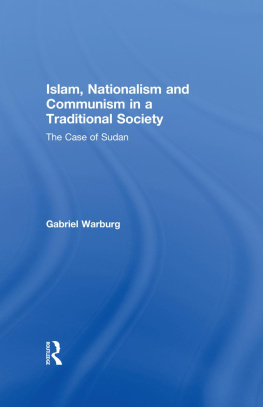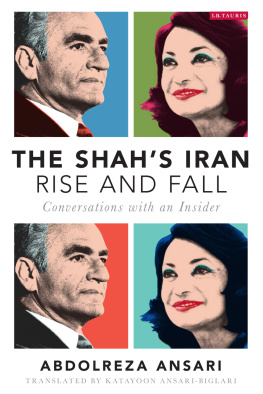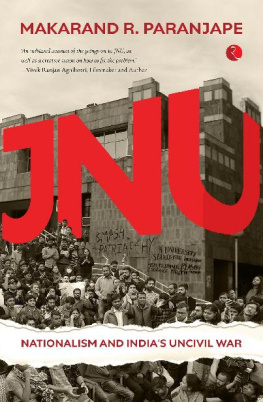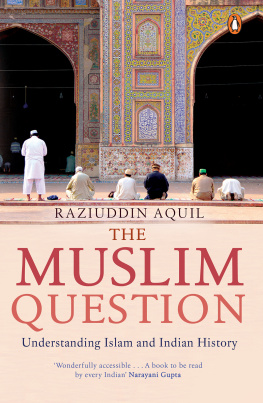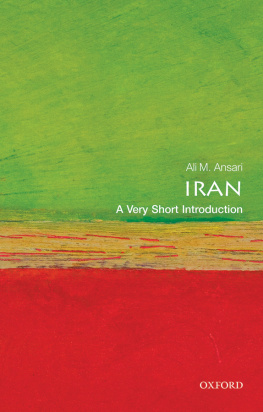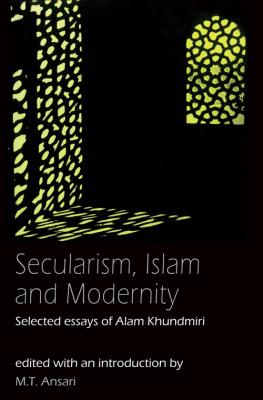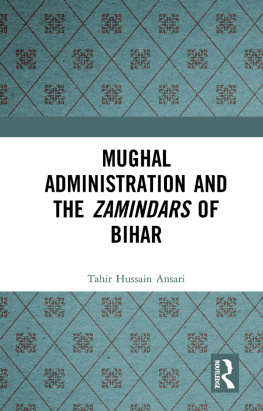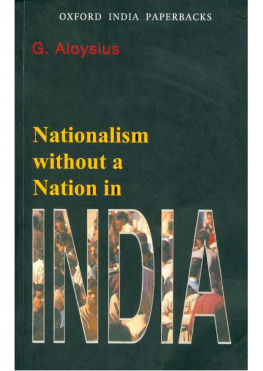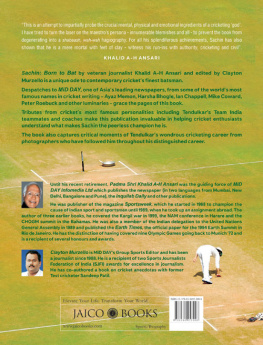M.T. Ansari - Islam and Nationalism in India
Here you can read online M.T. Ansari - Islam and Nationalism in India full text of the book (entire story) in english for free. Download pdf and epub, get meaning, cover and reviews about this ebook. year: 2015, publisher: Taylor and Francis, genre: Politics. Description of the work, (preface) as well as reviews are available. Best literature library LitArk.com created for fans of good reading and offers a wide selection of genres:
Romance novel
Science fiction
Adventure
Detective
Science
History
Home and family
Prose
Art
Politics
Computer
Non-fiction
Religion
Business
Children
Humor
Choose a favorite category and find really read worthwhile books. Enjoy immersion in the world of imagination, feel the emotions of the characters or learn something new for yourself, make an fascinating discovery.
Islam and Nationalism in India: summary, description and annotation
We offer to read an annotation, description, summary or preface (depends on what the author of the book "Islam and Nationalism in India" wrote himself). If you haven't found the necessary information about the book — write in the comments, we will try to find it.
Islam and Nationalism in India — read online for free the complete book (whole text) full work
Below is the text of the book, divided by pages. System saving the place of the last page read, allows you to conveniently read the book "Islam and Nationalism in India" online for free, without having to search again every time where you left off. Put a bookmark, and you can go to the page where you finished reading at any time.
Font size:
Interval:
Bookmark:
Islam in India, as elsewhere, continues to be seen as a remainder in its refusal to conform to national and international secular-modern norms. Such a general perception has also had a tremendous impact on the Muslims of the Indian sub-continent, who as individuals and communities have been shaped and transformed over centuries of socio-political and historical processes eroding their world-view and steadily erasing their life-worlds.
This book traces the spectral presence of Islam across narratives to note that difference and diversity, demographic as well as cultural, can be espoused rather than excised or exorcized. Focusing on Malabar home to the Mappila Muslim community in Kerala, South India and drawing mostly on Malayalam sources, the author investigates the question of Islam from various angles by constituting an archive comprising popular, administrative, academic, and literary discourses. The author contends that an uncritical insistence on unity has led to a formation in which minor subjects embody an excess of identity, in contrast to the Hinducitizen whose identity seemingly coincides with the national. This has led to Muslims being the source of a deep-seated anxiety for secular nationalism and the targets of a resurgent Hindutva, in that they expose the fault-lines of a geographically and socio-culturally unified nation.
An interdisciplinary study of Islam in India from the South Indian context, this book will be of interest to scholars of modern Indian history, political science, literary and cultural studies, and Islamic studies.
M. T. Ansari is Professor at the Centre for Comparative Literature, University of Hyderabad, India. He has received fellowships awarded by the Committee on Southern Asian Studies, University of Chicago, USA, and the Indian Institute of Advanced Study, India.
Edited by Gyanendra Pandey
Emory University, USA
Editorial Advisory Board: Partha Chatterjee, Columbia University/Calcutta; Michael Fisher, Oberlin College; Steven Hahn, University of Pennsylvania; David Hardiman, University of Warwick; Ruby Lal, Emory University and Rajeswari Sunder Rajan, New York University /Bangalore
This series is concerned with three kinds of intersections (or conversations): first, across cultures and regions, an interaction that postcolonial studies have emphasized in their foregrounding of the multiple sites and multi-directional traffic involved in the making of the modern; second, across time, the conversation between a mutually constitutive past and present that occurs in different times and places; and thirdly, between colonial and postcolonial histories, which as theoretical positions have very different perspectives on the first two intersections and the questions of intellectual enquiry and expression implied in them. These three kinds of conversations are critical to the making of any present and any history. Thus the new series provides a forum for extending our understanding of core issues of human society and its self-representation over the centuries.
While focusing on Asia, the series is open to studies of other parts of the world that are sensitive to cross-cultural, cross-chronological and cross-colonial perspectives. The series invites submissions for single-authored and edited books by young as well as established scholars that challenge the limitations of inherited disciplinary, chronological and geographical boundaries, even when they focus on a single well-bounded territory or period.
| 1 | Subaltern Citizens and their Histories Investigations from India and the USA Edited by Gyanendra Pandey |
| 2 | Subalternity and Religion The prehistory of Dalit Empowerment in South Asia Milind Wakankar |
| 3 | Communalism and Globalization in South Asia and its Diaspora Edited by Deana Heath and Chandana Mathur |
| 4 | Subalternity and Difference Investigations from the north and the south Edited by Gyanendra Pandey |
| 5 | Mixed-Race and Modernity in Colonial India Changing concepts of hybridity across Empires Adrian Carton |
| 6 | Medical Marginality in South Asia Situating subaltern therapeutics Edited by David Hardiman and Projit Bihari Mukharji |
| 7 | Hindi Cinema Repeating the subject Nandini Bhattacharya |
| 8 | New Indian Cinema in Post-Independence India The cultural work of Shyam Benegals films Anurada Dingwaney Needham |
| 9 | Silence in Middle Eastern and Western Thought The radical unspoken Jason Bahbak Mohaghegh |
| 10 | Unarchived Histories Edited by Gyanendra Pandey |
| 11 | Islam and Nationalism in India South Indian contexts M.T. Ansari |
South Indian contexts
M. T. Ansari

First published 2016
by Routledge
2 Park Square, Milton Park, Abingdon, Oxon OX14 4RN
and by Routledge
711 Third Avenue, New York, NY 10017
Routledge is an imprint of the Taylor & Francis Group, an informa business
2016 M.T. Ansari
The right of M.T. Ansari to be identified as author of this work has been asserted by him in accordance with sections 77 and 78 of the Copyright, Designs and Patents Act 1988.
All rights reserved. No part of this book may be reprinted or reproduced or utilised in any form or by any electronic, mechanical, or other means, now known or hereafter invented, including photocopying and recording, or in any information storage or retrieval system, without permission in writing from the publishers.
Trademark notice: Product or corporate names may be trademarks or registered trademarks, and are used only for identification and explanation without intent to infringe.
British Library Cataloguing in Publication Data
A catalogue record for this book is available from the British Library
Library of Congress Cataloging-in-Publication Data
Ansari, M. T.
Islam and nationalism in India : South Indian contexts / M.T. Ansari.
pages cm. (Intersections: colonial and postcolonial histories ; 11)
Includes bibliographical references and index.
1. NationalismReligions aspectsIslam. 2. Islam and politics
India, South. 3. NationalismIndia, South. 4. Malabar (India)
History20th century I. Title.
BP173.55.A57 2016
297.27209548dc23
2015022414
ISBN: 978-1-138-93406-1 (hbk)
ISBN: 978-1-315-67821-4 (ebk)
Typeset in Times New Roman
by Apex CoVantage, LLC
It is indeed a great pleasure and privilege to acknowledge the numerous people and institutions that I have been associated with during this long project. An enormous intellectual and personal debt is owed to Susie Tharu for piquing my interest in this area for a doctoral thesis, and also for putting up with my vagaries through the years. Teachers and fellow scholars at the Central Institute of English and Foreign Languages (now EFLU, Hyderabad) during 19931998; colleagues at the Sree Sankaracharya University of Sanskrit (Kalady) during 19982001; colleagues at the Maharaja Sayajirao University of Baroda (Vadodara) during 20012004; colleagues and students at the University of Hyderabad from 2004; and colleagues at the Indian Institute of Advanced Study (Shimla) during 20142015, are remembered with sincere gratitude.
Font size:
Interval:
Bookmark:
Similar books «Islam and Nationalism in India»
Look at similar books to Islam and Nationalism in India. We have selected literature similar in name and meaning in the hope of providing readers with more options to find new, interesting, not yet read works.
Discussion, reviews of the book Islam and Nationalism in India and just readers' own opinions. Leave your comments, write what you think about the work, its meaning or the main characters. Specify what exactly you liked and what you didn't like, and why you think so.



